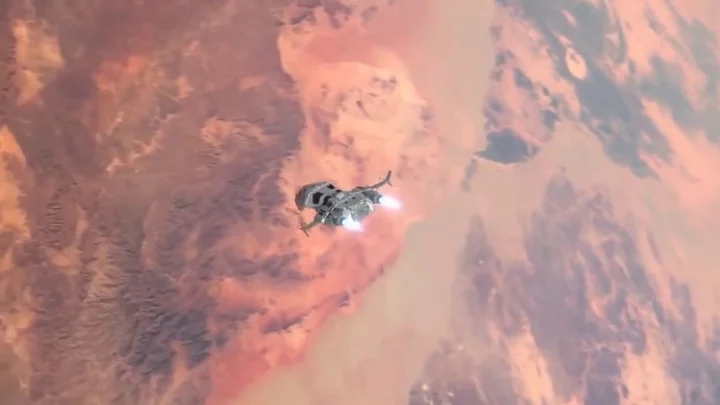When NASA’s Perseverance Rover observed an image from Mars of its moon Phobos eclipsing the Sun, it was a reminder that the astronomical body is doomed to crash into the planet. Phobos is the closest of Mars’ two moons and it is due to fall out of orbit relatively soon. When it does, it will either crash into the surface of the planet or break up completely. Before it does, it will drift ever closer to Mars at a relatively rapid rate. "Phobos is nearing Mars at a rate of six feet (1.8 meters) every hundred years; at that rate, it will either crash into Mars in 50 million years or break up into a ring," NASA says about the moon. Sign up to our free Indy100 weekly newsletter A statement about the recently recorded eclipse states: "Scientists already know that Phobos is doomed. “The moon is getting closer to the Martian surface and is destined to crash into the planet in tens of millions of years. But eclipse observations from the surface of Mars over the last two decades have also allowed scientists to refine their understanding of Phobos’ slow death spiral." NASA's Perseverance Rover Sees Solar Eclipse on Mars www.youtube.com Mars is the subject of much scientific interest right now, especially after Nasa discovered “diverse organic matter” on the surface of the planet, which could change our understanding of the red planet and the search for life in the universe. The Perseverance rover made the discovery in the Jezero Crater on Mars and a number of different explanations for the existence of the material have been posited. The materials could have been formed when water and dust interacted, or was dropped onto the planet by dust or meteors. Have your say in our news democracy. Click the upvote icon at the top of the page to help raise this article through the indy100 rankings.
When NASA’s Perseverance Rover observed an image from Mars of its moon Phobos eclipsing the Sun, it was a reminder that the astronomical body is doomed to crash into the planet.
Phobos is the closest of Mars’ two moons and it is due to fall out of orbit relatively soon. When it does, it will either crash into the surface of the planet or break up completely.
Before it does, it will drift ever closer to Mars at a relatively rapid rate.
"Phobos is nearing Mars at a rate of six feet (1.8 meters) every hundred years; at that rate, it will either crash into Mars in 50 million years or break up into a ring," NASA says about the moon.
Sign up to our free Indy100 weekly newsletter
A statement about the recently recorded eclipse states: "Scientists already know that Phobos is doomed.
“The moon is getting closer to the Martian surface and is destined to crash into the planet in tens of millions of years. But eclipse observations from the surface of Mars over the last two decades have also allowed scientists to refine their understanding of Phobos’ slow death spiral."
NASA's Perseverance Rover Sees Solar Eclipse on Mars www.youtube.com
Mars is the subject of much scientific interest right now, especially after Nasa discovered “diverse organic matter” on the surface of the planet, which could change our understanding of the red planet and the search for life in the universe.
The Perseverance rover made the discovery in the Jezero Crater on Mars and a number of different explanations for the existence of the material have been posited.
The materials could have been formed when water and dust interacted, or was dropped onto the planet by dust or meteors.
Have your say in our news democracy. Click the upvote icon at the top of the page to help raise this article through the indy100 rankings.









